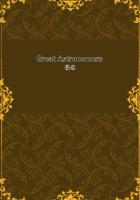The imperial party were convinced that the Christian princes would adhere to the Holy Scriptures as superior to human doctrines and requirements; and they knew that wherever this principle was accepted, the papacy would eventually be overthrown. But, like thousands since their time, looking only "at the things which are seen," they flattered themselves that the cause of the emperor and the pope was strong, and that of the Reformers weak. Had the Reformers depended upon human aid alone, they would have been as powerless as the papists supposed. But though weak in numbers, and at variance with Rome, they had their strength. They appealed "from the report of the Diet to the word of God, and from the emperor Charles to Jesus Christ, the King of kings and Lord of lords."--Ibid., b. 13, ch. 6.
As Ferdinand had refused to regard their conscientious convictions, the princes decided not to heed his absence, but to bring their Protest before the national council without delay. A solemn declaration was therefore drawn up and presented to the Diet:
"We protest by these presents, before God, our only Creator, Preserver, Redeemer, and Saviour, and who will one day be our Judge, as well as before all men and all creatures, that we, for us and for our people, neither consent nor adhere in any manner whatsoever to the proposed decree, in anything that is contrary to God, to His holy word, to our right conscience, to the salvation of our souls.""What! we ratify this edict! We assert that when Almighty God calls a man to His knowledge, this man nevertheless cannot receive the knowledge of God!""There is no sure doctrine but such as is conformable to the word of God. .
. . The Lord forbids the teaching of any other doctrine. . . . The Holy Scriptures ought to be explained by other an clearer texts; . . . this Holy Book is, in all things necessary for the Christian, easy of understanding, and calculated to scatter the darkness. We are resolved, with the grace of God, to maintain the pure and exclusive preaching of His only word, such as it is contained in the biblical books of the Old and New Testaments, without adding anything thereto that may be contrary to it. This word is the only truth; it is the sure rule of all doctrine and of all life, and can never fail or deceive us. He who builds on this foundation shall stand against all the powers of hell, while all the human vanities that are set up against it shall fall before the face of God.""For this reason we reject the yoke that is imposed on us." "At the same time we are in expectation that his imperial majesty will behave toward us like a Christian prince who loves God above all things; and we declare ourselves ready to pay unto him, as well as unto you, gracious lords, all the affection and obedience that are our just and legitimate duty."--Ibid., b. 13, ch. 6.
A deep impression was made upon the Diet. The majority were filled with amazement and alarm at the boldness of the protesters. The future appeared to them stormy and uncertain. Dissension, strife, and bloodshed seemed inevitable. But the Reformers, assured of the justice of their cause, and relying upon the arm of Omnipotence, were "full of courage and firmness.""The principles contained in this celebrated Protest . . . constitute the very essence of Protestantism. Now this Protest opposes two abuses of man in matters of faith: the first is the intrusion of the civil magistrate, and the second the arbitrary authority of the church. Instead of these abuses, Protestantism sets the power of conscience above the magistrate, and the authority of the word of God above the visible church. In the first place, it rejects the civil power in divine things, and says with the prophets and apostles, 'We must obey God rather than man.' In presence of the crown of Charles the Fifth, it uplifts the crown of Jesus Christ. But it goes farther: it lays down the principle that all human teaching should be subordinate to the oracles of God."--Ibid., b.
13, ch. 6. The protesters had moreover affirmed their right to utter freely their convictions of truth. They would not only believe and obey, but teach what the word of God presents, and they denied the right of priest or magistrate to interfere. The Protest of Spires was a solemn witness against religious intolerance, and an assertion of the right of all men to worship God according to the dictates of their own consciences.
The declaration had been made. It was written in the memory of thousands and registered in the books of heaven, where no effort of man could erase it.
All evangelical Germany adopted the Protest as the expression of its faith.
Everywhere men beheld in this declaration the promise of a new and better era. Said one of the princes to the Protestants of Spires: "May the Almighty, who has given you grace to confess energetically, freely, and fearlessly, preserve you in that Christian firmness until the day of eternity."--Ibid., b. 13, ch. 6.
Had the Reformation, after attaining a degree of success, consented to temporize to secure favor with the world, it would have been untrue to God and to itself, and would thus have ensured its own destruction. The experience of these noble Reformers contains a lesson for all succeeding ages. Satan's manner of working against God and His word has not changed; he is still as much opposed to the Scriptures being made the guide of life as in the sixteenth century. In our time there is a wide departure from their doctrines and precepts, and there is need of a return to the great Protestant principle--the Bible, and the Bible only, as the rule of faith and duty.
Satan is still working through every means which he can control to destroy religious liberty. The antichristian power which the protesters of Spires rejected is now with renewed vigor seeking to re-establish its lost supremacy. The same unswerving adherence to the word of God manifested at that crisis of the Reformation is the only hope of reform today.















